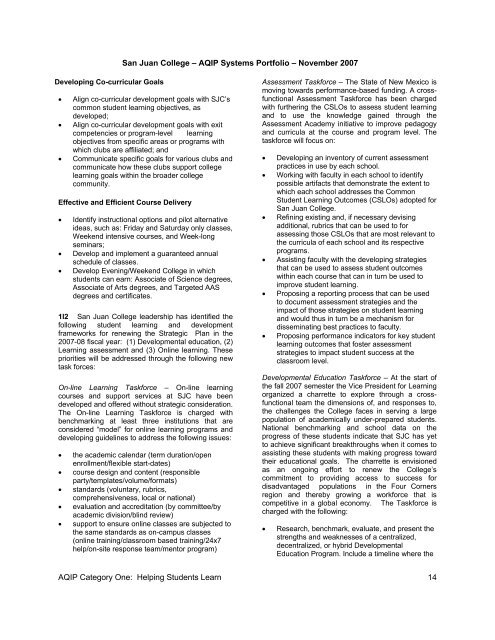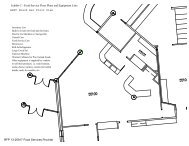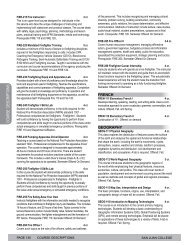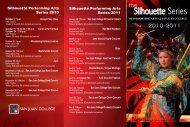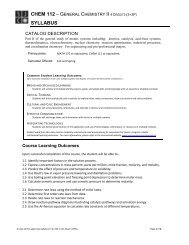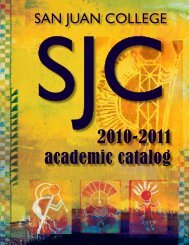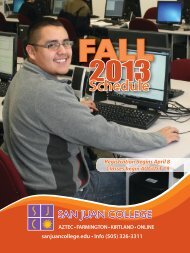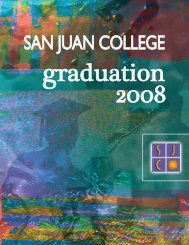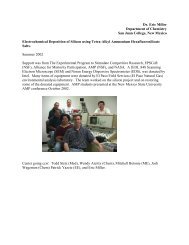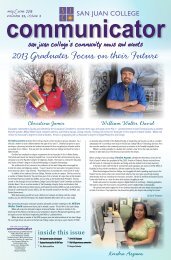AQIP 2007 Systems Portfolio - San Juan College
AQIP 2007 Systems Portfolio - San Juan College
AQIP 2007 Systems Portfolio - San Juan College
You also want an ePaper? Increase the reach of your titles
YUMPU automatically turns print PDFs into web optimized ePapers that Google loves.
<strong>San</strong> <strong>Juan</strong> <strong>College</strong> – <strong>AQIP</strong> <strong>Systems</strong> <strong>Portfolio</strong> – November <strong>2007</strong>Developing Co-curricular Goals• Align co-curricular development goals with SJC’scommon student learning objectives, asdeveloped;• Align co-curricular development goals with exitcompetencies or program-level learningobjectives from specific areas or programs withwhich clubs are affiliated; and• Communicate specific goals for various clubs andcommunicate how these clubs support collegelearning goals within the broader collegecommunity.Effective and Efficient Course Delivery• Identify instructional options and pilot alternativeideas, such as: Friday and Saturday only classes,Weekend intensive courses, and Week-longseminars;• Develop and implement a guaranteed annualschedule of classes.• Develop Evening/Weekend <strong>College</strong> in whichstudents can earn: Associate of Science degrees,Associate of Arts degrees, and Targeted AASdegrees and certificates.1I2 <strong>San</strong> <strong>Juan</strong> <strong>College</strong> leadership has identified thefollowing student learning and developmentframeworks for renewing the Strategic Plan in the<strong>2007</strong>-08 fiscal year: (1) Developmental education, (2)Learning assessment and (3) Online learning. Thesepriorities will be addressed through the following newtask forces:On-line Learning Taskforce – On-line learningcourses and support services at SJC have beendeveloped and offered without strategic consideration.The On-line Learning Taskforce is charged withbenchmarking at least three institutions that areconsidered “model” for online learning programs anddeveloping guidelines to address the following issues:• the academic calendar (term duration/openenrollment/flexible start-dates)• course design and content (responsibleparty/templates/volume/formats)• standards (voluntary, rubrics,comprehensiveness, local or national)• evaluation and accreditation (by committee/byacademic division/blind review)• support to ensure online classes are subjected tothe same standards as on-campus classes(online training/classroom based training/24x7help/on-site response team/mentor program)Assessment Taskforce – The State of New Mexico ismoving towards performance-based funding. A crossfunctionalAssessment Taskforce has been chargedwith furthering the CSLOs to assess student learningand to use the knowledge gained through theAssessment Academy initiative to improve pedagogyand curricula at the course and program level. Thetaskforce will focus on:• Developing an inventory of current assessmentpractices in use by each school.• Working with faculty in each school to identifypossible artifacts that demonstrate the extent towhich each school addresses the CommonStudent Learning Outcomes (CSLOs) adopted for<strong>San</strong> <strong>Juan</strong> <strong>College</strong>.• Refining existing and, if necessary devisingadditional, rubrics that can be used to forassessing those CSLOs that are most relevant tothe curricula of each school and its respectiveprograms.• Assisting faculty with the developing strategiesthat can be used to assess student outcomeswithin each course that can in turn be used toimprove student learning.• Proposing a reporting process that can be usedto document assessment strategies and theimpact of those strategies on student learningand would thus in turn be a mechanism fordisseminating best practices to faculty.• Proposing performance indicators for key studentlearning outcomes that foster assessmentstrategies to impact student success at theclassroom level.Developmental Education Taskforce – At the start ofthe fall <strong>2007</strong> semester the Vice President for Learningorganized a charrette to explore through a crossfunctionalteam the dimensions of, and responses to,the challenges the <strong>College</strong> faces in serving a largepopulation of academically under-prepared students.National benchmarking and school data on theprogress of these students indicate that SJC has yetto achieve significant breakthroughs when it comes toassisting these students with making progress towardtheir educational goals. The charrette is envisionedas an ongoing effort to renew the <strong>College</strong>’scommitment to providing access to success fordisadvantaged populations in the Four Cornersregion and thereby growing a workforce that iscompetitive in a global economy. The Taskforce ischarged with the following:• Research, benchmark, evaluate, and present thestrengths and weaknesses of a centralized,decentralized, or hybrid DevelopmentalEducation Program. Include a timeline where the<strong>AQIP</strong> Category One: Helping Students Learn 14


